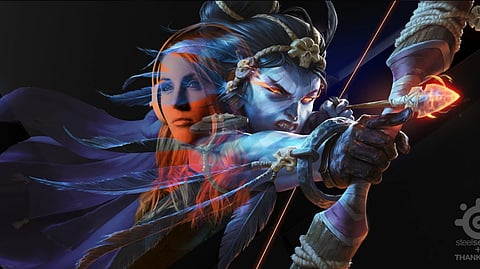
Drawing, painting, computers and gaming – Felix Bauer’s interests were always varied but finding a viable career option from it all was a whole different ballgame. Eventually it was a stint at UCL, some doodling and an old art teacher that led him to an animation course at Bournemouth University and concept art. After graduation he started working at Opus Artz, an indie art studio and then there was no looking back.
One look at his portfolio and you can see how diverse Felix’s sketching styles and he attributes it to 2 things. Firstly, In the beginning of his career he often copied other artists as a way to learn, while also searching for his own style (It’s a journey he is still on, by the way!). Secondly, while at Opus Artz he often worked on multiple projects simultaneously, all from different clients; all in different styles.
In the morning a hardcore gritty FPS game, and by the afternoon a stylized top-down RPG open world adventure game. Concept Art is a wild ride but it helped train him to understand and use as many different styles as he sees fit. Today, he is certainly grateful that he can draw upon that diverse knowledge he gained early on. (Pun intended)
But it's always great to gather references that closely match what you're trying to create, so that’s where he always starts. And if one can't find a close match, then find the closest thing to it. To create a unicorn for example, he would be gathering references of real-world horned creatures, horses and any historical depictions of the matter at hand. His rule of thumb however is to always stay away from other artists renditions.
The real world is a great source of inspiration for him. Nothing beats going outside and actually seeing and experiencing the real world for some fuel for creative expression. Music and other entertainment media are a close second. However, sometimes coming up with illustration concepts is tough!
The machine-artist relationship is complicated. It is a challenge keeping up with the onslaught of new tools and workflows. AI is a huge new field that Felix believes concept artists should not ignore as it will benefit their workflow immensely. However, the question often arises - where does the artist end, and the machine takes over?
When is it art, or curated randomness? Eventually anything an artist decides to share is inherently curated but problems emerge when tools like AI mindlessly grab an existing artwork and inject it into its output. If that happens, the artist should be aware of that beforehand, knowingly using it to create something that is inherently recycled, and be deliberate about why they choose to do so. Using AI tools in the right way will keep artists above the figurative kindergarten of wannabe artists who think that prompting is the same as crafting art with your own hands. Spoiler alert – It is not.
To become a game artist, he says the first focus should be on basic art fundamentals - perspective and proportion. “You just can’t fake good line drawings.” It is important that whatever one chooses, they need to practice a lot and stay focused.
Trying out too many things and never going in depth into any one of them may result in not actually learning anything at all. It's the shiny object syndrome. Explore and do what makes you happy. His advice is to always try to have fun with any task and challenge presented to you. Even if it is tough, or laborious, or repetitive, there is always an angle that makes it interesting. If one can do that, there is no limit to what you can achieve!